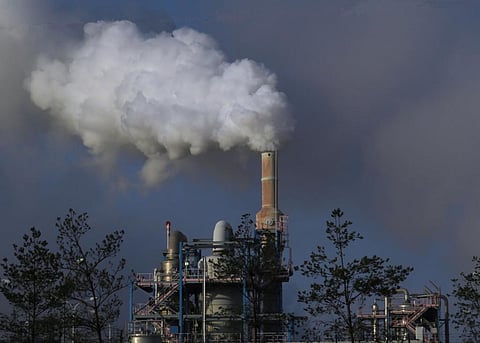Empty posts in Uttar Pradesh’s Pollution Control Board are affecting implementation of green laws in state
One of the biggest challenges India faces today is maintaining economic growth that is aided by higher levels of industrialisation, but in an environmentally sustainable manner. The industrial growth rate over the last decade has not gone hand-in-hand with the mandate of environmental sustainability.
This has led to poor air quality in cities, polluted rivers and groundwater and improper handling of non-hazardous and hazardous waste — all contributing to the degradation of the environment.
Regulatory institutions in the country are in place to ensure sustainable development along with the protection of the environment. These institutions were created to ensure that industrial development does not occur at the cost of the environment and public health. However, the purpose of establishing State Pollution Control Boards is restricted due to the limited number of staff. Many SPCBs in India are grappling with shortage of workforce.
The Pollution Control Board in Uttar Pradesh (UP) is one of those facing this issue. A recent order by the National Green Tribunal (NGT) directed a notice be issued to the UP government and the UP Pollution Control Board (UPPCB) over allegations that posts of officers in the Board were lying vacant.
“The functioning of UPPCB has a direct effect on the implementation of environmental law,” the NGT said. The next date of hearing in the case has been listed for December 14, 2023.
UP is one of the most industrialised states in India. As per the Union Ministry of Micro, Small and Medium Enterprises’ Annual Report, 2022-23, the state had the largest number of estimated micro, small and medium enterprises (MSME), with a share of 14.20 per cent in the country. This comes out to about 8.9 million such enterprises in UP.
This figure is only the MSME figure and does not include large scale industries. To deal with such a large number of industries, UPPCB has 28 regional offices. For better inspection and monitoring, every SPCB has its own regional offices and the number of offices in the state depend upon the the distribution of industries and area of the state.
However, the number of staff in the UPPCB regional offices is not adequate. Out of 732 sanctioned posts, 293 or 40 per cent posts are vacant. The inadequate number of workers hinders the functioning of the Board.
The regulatory bodies have been entrusted with wide range of responsibilities ranging from granting consent, ensuring compliance with consent condition through inspection and monitoring of industries, implementing National Ambient Air and Water Quality standards, actions against defaulting industries like showcase / direction / closure notice, inventorising waste and dealing with NGT / court cases as and when required, and implementation of polices, etc.
To perform all the above-mentioned functions, just 60 per cent staff in UPPCB is insufficient.
Structuring and workforce allocation shall be decided as per centralised policy, said UPPCB Regional Officer for Gautam Budh Nagar (Noida) Utsav Sharma. “However, in view of challenges and litigations in this field, it’s important that strengthening be done at the earliest,” he said.
Not just UPPCB, a similar situation prevails throughout India. Neither the Central Pollution Control Board nor the State Pollution Control Board / UT Boards have adequate strength to perform their duties.
As per the data shared by the Union Ministry of Environment, Forest and Climate Change in the Lok Sabha, Jharkhand has 87 per cent empty posts, Bihar has 78 per cent vacant posts, Madhya Pradesh has 64 per cent vacant positions and in Haryana, 63 posts are not filled. The data revealed that in spite of an increase in the number of industries, the regulatory authorities have not been strengthened accordingly.
Cities in states like UP, Rajasthan and Haryana that fall under the National Capital Region have the additional responsibility of implementing the Graded Response Action Plan (GRAP) — a set of emergency measures that kick in to prevent further deterioration of air quality once it reaches a certain threshold, specially in the winters.
During the implementation of GRAP actions, a number of inspection and monitoring activities are conducted to cut down emissions in Delhi-NCR. To fullfil additional responsibilities, adequate personnel is the pressing priority.
Examples of SPCBs with vacant posts
|
S. No |
SPCBs |
Sanctioned posts |
Vacant posts |
Percentage of vacancies |
|
1 |
Jharkhand |
271 |
237 |
87 |
|
2 |
Bihar |
264 |
206 |
78 |
|
3 |
Madhya Pradesh |
1,228 |
781 |
64 |
|
4 |
Haryana |
481 |
303 |
63 |
|
5 |
Andhra Pradesh |
289 |
182 |
63 |
|
6 |
Uttarakhand |
130 |
80 |
62 |
|
7 |
Karnataka |
723 |
428 |
60 |
|
8 |
Chhattisgarh |
328 |
197 |
60 |
Some SPCBs are dependent on various State Public Service Commission exams for hiring staff, which is actually a time-consuming process. SPCBs have been given the authority to recruit staff with the required expertise under its own recruitment rules, duly approved by the state government as stated in the Acts.
“The Bihar State Pollution Control Board (BSPCB) has recently notified the service and recruitment rules for our different cadres with the approval of the state government, as per the prescribed provisions,” said a BSPCB official. “The roaster clearance from the state government is under process and has been initiated and is moving fast to fill the vacant posts.”
Like BSPCB, the Rajasthan State Pollution Control Board also has its own service and recruitment rules for hiring staff. Some of the other boards may have their own service and recruitment rules, but many do not. In a similar manner, all SPCBs must take initiative and should have their own service and recruitment rules for hiring staff.


